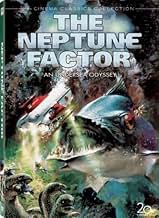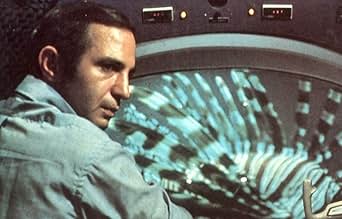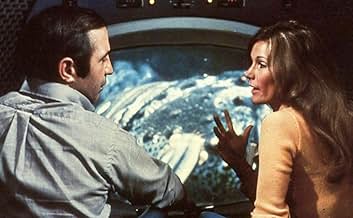IMDb RATING
4.4/10
1.4K
YOUR RATING
When an underwater ocean lab is lost in a earthquake, an advanced submarine is sent down to find it and encounters terrible danger.When an underwater ocean lab is lost in a earthquake, an advanced submarine is sent down to find it and encounters terrible danger.When an underwater ocean lab is lost in a earthquake, an advanced submarine is sent down to find it and encounters terrible danger.
- Awards
- 1 nomination total
Ken Pogue
- Diver Thomas
- (as Kenneth Pogue)
- Director
- Writer
- All cast & crew
- Production, box office & more at IMDbPro
Featured reviews
This waterlogged bore is about 100 minutes but feels about 120 minutes too long. A film so dull even the cast can't rouse itself from lethargy. Yvette Mimieux evidently decided her paycheck was only enough to guarantee that she'd show up, because her performance consists of only one half-lost/blank stare throughout. Borgnine, once again in the water (McHale, Poseidon, etc.) can barely rouse himself to his usual level of histrionics. Gazzara tries a southern accent and fails, while Walter Pigeon plods through his role, obviously taking his check to pad his retirement fund (he actually turned in a fine performance the following year in 'Harry in Your Pocket'). This is a Canadian film, thus it's restricted budget-wise, but why bother making a film like this if you haven't got the money for the special effects? We're talking $1.98 here. It looks like the producers bought a little toy submersible and borrowed someone's aquarium and let er rip. Okay, this is pre-Star Wars, effects-wise, but no one could take this seriously even back in 1973. Oh the look of fear and awe on Borgnine's face when he sees a.... giant goldfish! Perhaps the only thing of (minor) interest is whether James Cameron was inspired by this film to create 'The Abyss.' It does have some of the same elements. Of course, unlike 'The Abyss', this film is idiotic (example: Gazzara yelling at Mimieux for putting the sub in danger of exploding from sea pressure, yet the same pressure has no effect on HUMAN BODIES swimming around in EVEN GREATER DEPTHS soon after), and it's dully plotted, acted, directed, written, scored. Well, it IS consistent!
For a movie about a race against the clock to rescue a group of scientists trapped in an undersea research facility that's been hit by an earthquake, The Neptune Factor is incredibly dull. The problem is that for most of the movie, nothing happens. Ernest Borgnine (who I'll give a little credit as he does his best with this snoozer of a script), Ben Gazzara, and company spend most of the movie on a slow motion tour of the ocean floor looking for their missing colleagues. Garzzara is the worst, showing the same kind of emotion usually reserved for everyday, mundane tasks like doing the laundry or grocery shopping. You'd hardly know from his demeanor that the lives of three people rest in his hands. And when something does finally happen the special effects are so ridiculous looking that the movie losses any credibility it might have had. The "giant" sea creatures the rescuers run into are little more than normal salt water aquarium fish filmed with a zoom lens and a bad looking miniature of the submarine. That's right - The Neptune Factor looks like it was filmed in someone's home aquarium. A giant clown fish - oooooh, how scary! There's nothing much more frightening than the sight of a ludicrously large Nemo.
To say I was disappointed by The Neptune Factor would be a gross understatement. A good cast is put to waste with nothing to do. In the end, I've got to rate this one a 2/10.
To say I was disappointed by The Neptune Factor would be a gross understatement. A good cast is put to waste with nothing to do. In the end, I've got to rate this one a 2/10.
An earthquake under the ocean floor hits a lab on the seabed. As a result, it's umbilical cord to the surface ship is severed and the lab tossed over a sheer underwater cliff. Now it is so deep that conventional divers cannot reach it, so the only hope is a deep water submersible, the Neptune.
Despite the film being about an ocean disaster, it's amazing just how static and dull the movie is. I think the main problem is pacing...not acting, as the actors are generally a very accomplished group of professionals. Too often, the director chose to portray the film in the least exciting manner....and I had to really struggle to pay attention or even to care.
By the way, although I don't recommend anyone see this movie, scuba divers might enjoy watching some of the diving sequences...especially when the DIve Master is thrashing about in the water like he just got his certification yesterday!
Despite the film being about an ocean disaster, it's amazing just how static and dull the movie is. I think the main problem is pacing...not acting, as the actors are generally a very accomplished group of professionals. Too often, the director chose to portray the film in the least exciting manner....and I had to really struggle to pay attention or even to care.
By the way, although I don't recommend anyone see this movie, scuba divers might enjoy watching some of the diving sequences...especially when the DIve Master is thrashing about in the water like he just got his certification yesterday!
Not as exciting as the box cover artwork might suggest, with a painfully stilted characterisation by Ben Gazzara and capable supporting cast trapped in one-dimensional roles. The story concerns militant, officious salvage expert (Gazzara) contracted by an aquatic research team to recover a stricken underwater manned probe that has descended into a deep sea ravine. Gazzara makes it clear from the outset that his goal is only to locate the vessel for insurance purposes, except Mimieux's companion is one of those aboard and she ups the ante in spite of escalating challenges.
Pidgeon and Borgnine have little opportunity to establish any characterisation, while Mimieux simply frets and affects anxiety to demonstrate her 'depth' of character. The friction between her and Gazzara is about the only palpable action in the whole picture. The special effects consist of intense magnification of gold fish and other aquarium species, while endless jolts and turbulence puts you in the environmental context. As far as dialogue goes, the technical spec consists mainly of references to rudder malfunction and oxygen saturation. Riveting stuff.
Disappointingly, the film ends abruptly where it could have developed a more convincing, compelling climax. After waiting 95 minutes, the audience is treated to a Jules Verne moment in which 'giant' eels corral the probe's survivors as they run out of oxygen. But just as the action gains momentum, the film ends. Five more minutes of that encounter might have earned another star, but this underwater adventure is mostly talk and no action.
Pidgeon and Borgnine have little opportunity to establish any characterisation, while Mimieux simply frets and affects anxiety to demonstrate her 'depth' of character. The friction between her and Gazzara is about the only palpable action in the whole picture. The special effects consist of intense magnification of gold fish and other aquarium species, while endless jolts and turbulence puts you in the environmental context. As far as dialogue goes, the technical spec consists mainly of references to rudder malfunction and oxygen saturation. Riveting stuff.
Disappointingly, the film ends abruptly where it could have developed a more convincing, compelling climax. After waiting 95 minutes, the audience is treated to a Jules Verne moment in which 'giant' eels corral the probe's survivors as they run out of oxygen. But just as the action gains momentum, the film ends. Five more minutes of that encounter might have earned another star, but this underwater adventure is mostly talk and no action.
The Neptune Factor deals with some scientists who live and work out of an undersea lab in the Atlantic Ocean. One fine day while their bosses, Walter Pidgeon, Yvette Mimieux, and Ernest Borgnine are up top, an earthquake occurs and the lab topples over into an underwater crevice.
Though an atomic power submarine could stay down there indefinitely the problem is that crevice is way too small for one of those big boys. A smaller type submarine able to withstand the pressures of the very deep is needed and that's where Ben Gazzara and his ship the Neptune come in.
As disaster films go The Neptune Factor is small potatoes special effects wise. It's a Canadian production and I've seen Hollywood come up with worse films spending a ton more money than was done here.
The special effects such as they are, are merely movie films of some ordinary species of marine life blown up several times their size, because these are the creatures the crew finds down at depths that man hasn't been before. It's beautiful undersea photography just like a trip to Marineland.
It's a no frills production, no subplots of any kind, no social interaction of any kind with the crew, just do the mission and go home. That's why it was given a G rating when first released.
If you love Jacques Cousteau, you'll love this film.
Though an atomic power submarine could stay down there indefinitely the problem is that crevice is way too small for one of those big boys. A smaller type submarine able to withstand the pressures of the very deep is needed and that's where Ben Gazzara and his ship the Neptune come in.
As disaster films go The Neptune Factor is small potatoes special effects wise. It's a Canadian production and I've seen Hollywood come up with worse films spending a ton more money than was done here.
The special effects such as they are, are merely movie films of some ordinary species of marine life blown up several times their size, because these are the creatures the crew finds down at depths that man hasn't been before. It's beautiful undersea photography just like a trip to Marineland.
It's a no frills production, no subplots of any kind, no social interaction of any kind with the crew, just do the mission and go home. That's why it was given a G rating when first released.
If you love Jacques Cousteau, you'll love this film.
Did you know
- TriviaProducer Sandy Howard consulted a large number of marine biologists, oceanographers, and ichthyologists two years prior to taking the script into production.
- GoofsNeptune's crew was able to watch through the submarine's glass window all the objects and fish around them under sunlight although they were deeper than 300 meters from the sea surface. Sunlight is barely seen in the sea bottom at depths greater than 200m.
- Quotes
Dr. Leah Jansen: And those jawfish! The ones I've seen have been only two inches long. Look at them!
- ConnectionsReferenced in Contre une poignée de diamants (1974)
Details
- Release date
- Countries of origin
- Language
- Also known as
- The Neptune Disaster
- Filming locations
- Production companies
- See more company credits at IMDbPro
Box office
- Budget
- CA$2,500,000 (estimated)
Contribute to this page
Suggest an edit or add missing content
































